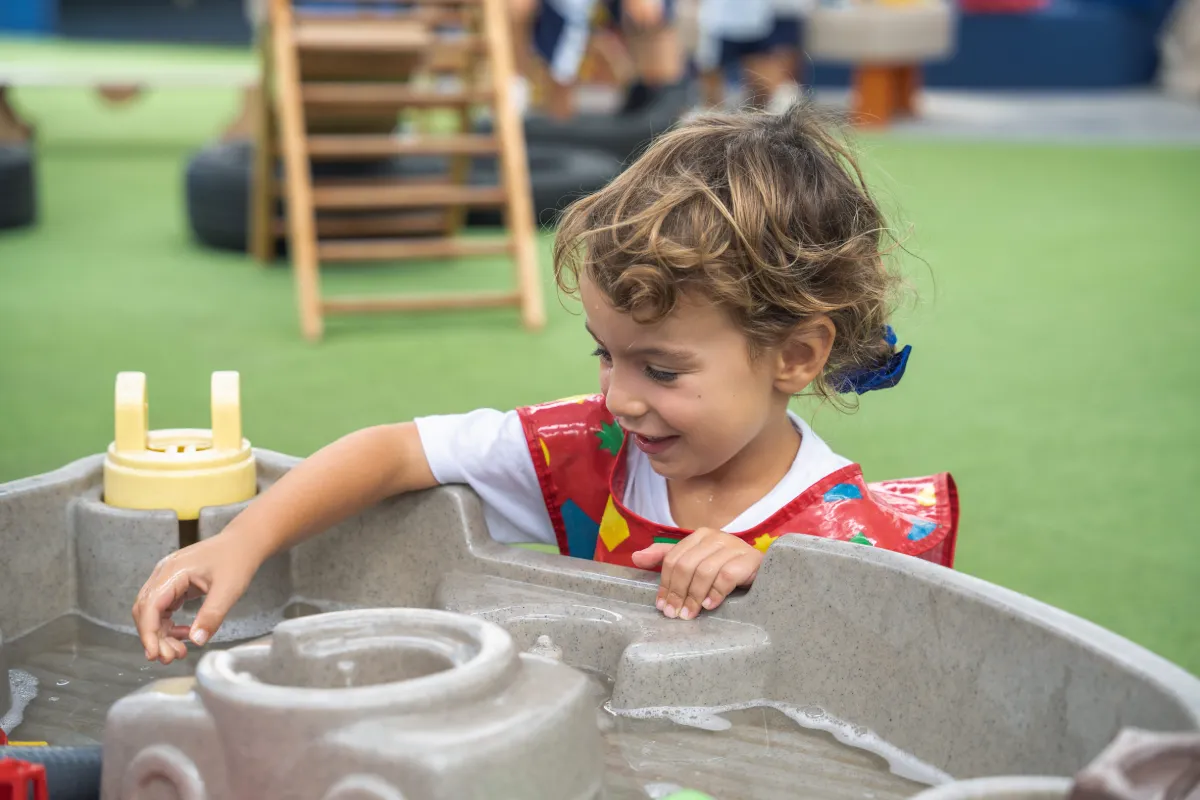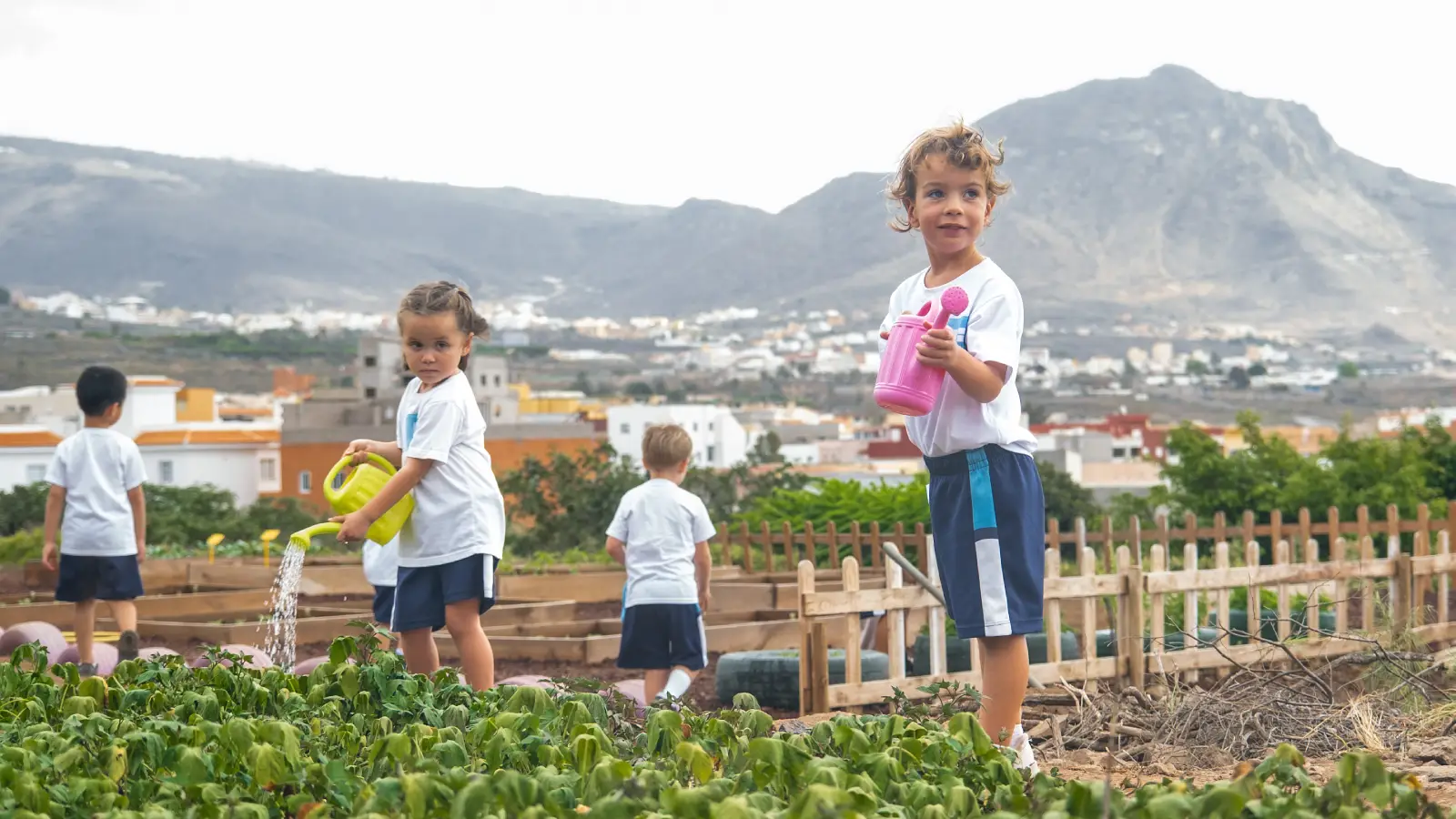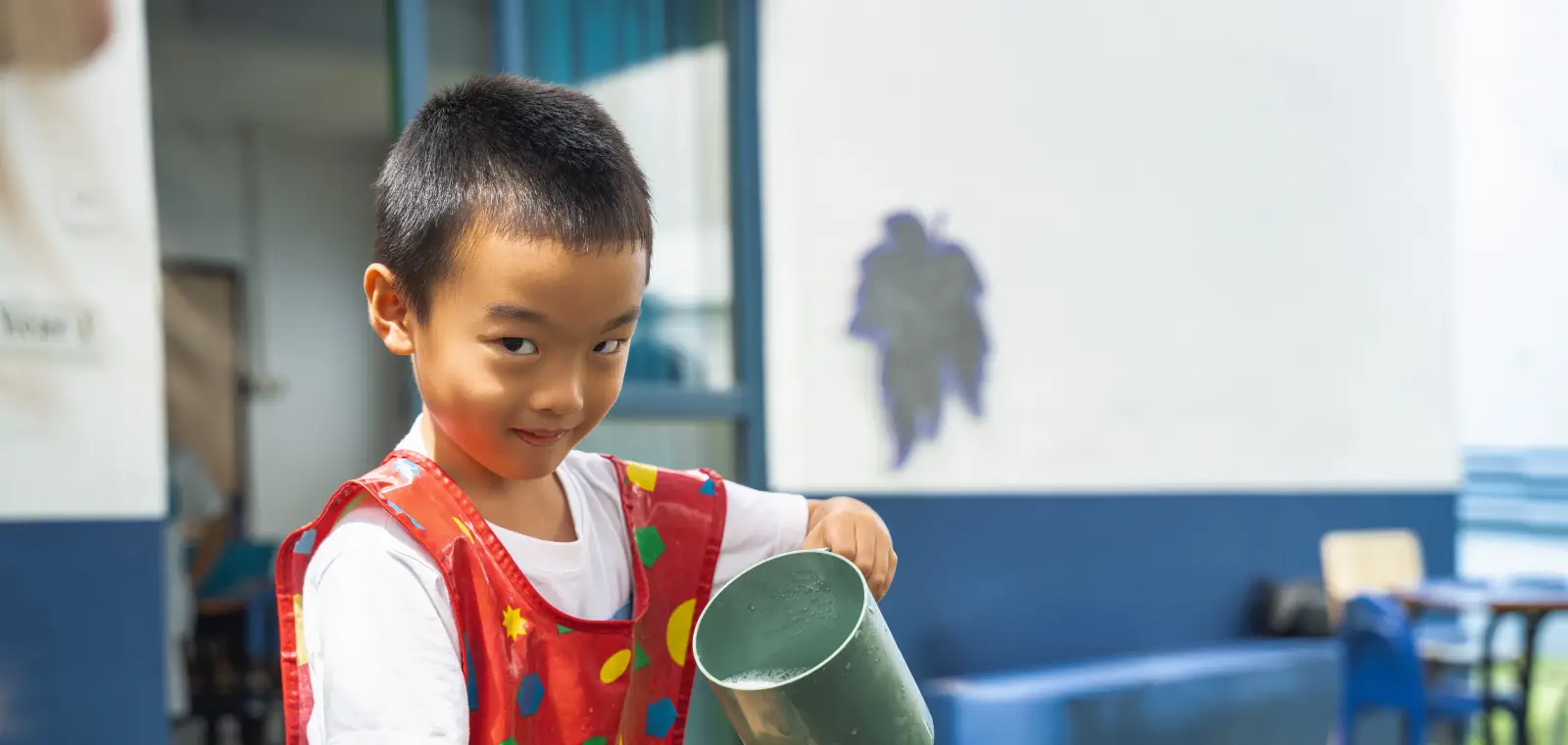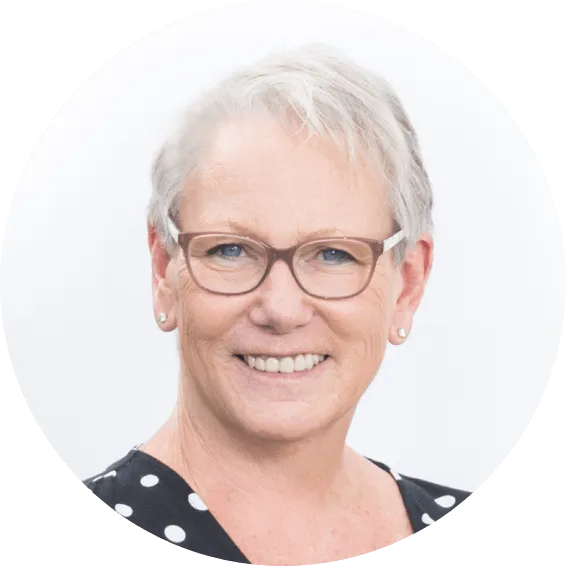At Wingate, we offer our students a diverse range of learning experiences that lay the foundation for their continuous development throughout their time at Wingate School.
Students embark on their journey at Wingate in the Early Years Foundation Stage (EYFS). With only two classes for children aged three and above, each day is filled with excitement, exploration, and learning! Our experienced professionals guide and support the children, diligently addressing their individual needs. A broad array of activities fosters independence, skills, and knowledge across the seven areas of the British EYFS curriculum.
Each class has access to an outdoor area where children can explore, work, and play. We create numerous opportunities for all our Foundation Stage children to interact and learn together. We place a strong emphasis on involving parents in their children’s learning journey through conversations, photographs, videos, weekly emails, and concerts. Children, parents, and teachers form a vital team, and effective communication is essential for achieving the best results and enjoyment.

By the end of Foundation Stage 2, we establish strong links with Year 1 to facilitate a smooth transition into Primary. This prepares the children with an enthusiastic outlook as they progress to the next stage of their learning!
Curriculum overview
The essence of the Wingate Education
“Our aim is to provide the children with a wide variety of learning experiences which will be the FOUNDATIONS for their continued learning/development throughout the school. Comprising two classes, with children as young as 3 years old, each day is full of experiences, excitement and learning!”
Foundation Stage 1
The development of children’s spoken language underpins all seven areas of learning and development. It involves providing opportunities to speak and listen in a range of situations and develop their confidence and skill in expressing themselves.
In Foundation 1 the children are encouraged to listen to what other children and adults have to say through a wide variety of learning experiences which include story times and whole class activities. Throughout the year we work hard to develop the children’s spoken language, building up vocabulary so they can express themselves effectively and use simple sentences. By the end of Foundation 1 (F1) the children are expected to be able to understand simple questions and respond to basic instructions.
Children’s personal, social and emotional development is crucial for children to lead healthy and happy lives. It involves helping the children to develop a positive sense of themselves and others and to have confidence in their own abilities. The children are encouraged to play cooperatively, learning how to share and take turns. It would be hoped that during this year they form good relationships with other children and adults.
During the year the children make progress in asking familiar adults for help when necessary and gain confidence in new social situations. Children are expected to make progress in learning to understand and cooperate with some boundaries and routines and to accept the needs of others and adapt their behaviour for different events and changes in routine.
Physical activity is vital in children’s all-round development, enabling them to pursue happy, healthy and active lives. This involves providing opportunities for the children to be active and interactive and to develop their coordination, control and movement. In Foundation 1 we help the children to understand the importance of physical activity and to make healthy choices in relation to food.
Our weekly P.E. sessions allow for a more focussed development of such skills as jumping, running, rolling, hopping, skipping etc and ball skills. Physical development also means small movements such as threading, holding a pencil or paintbrush and using one handed tools e.g. scissors. From the start of F1, the children are encouraged to manage their own personal hygiene and personal needs and become independent in using the toilet, washing hands and feeding themselves.
Comprehension and word reading – The children regularly listen to and join in with stories and rhymes. They are encouraged to look at books independently and to describe the main story settings, events and principal characters. In this year it would be expected that most children would learn to recognise their name and be aware of letters in signs and labels etc.
Writing – Our focus in this year is to help the children develop their gross motor and fine motor skills to enable them to hold a pencil effectively.
Opportunities for the children to use a variety of mediums and tools are available each week and during the year the children learn to write their own name with attention to correct letter formation.
Developing a strong grounding in number is essential so that all children develop the necessary building blocks to excel mathematically. By the end of the year, many children will be able to recognise and write numbers to 10. They will be able to subitize to 5, count reliably up to 10, find the total number of objects and begin to have an awareness of numbers in everyday life. The children will be able to name some shapes and use everyday language to talk about size, weight, capacity, position and length.
This involves guiding the children to make sense of their physical world and their community. Throughout their time in our Foundation Stage the children are encouraged to show interest in the world around them, to talk about the things they observe and show care and concern for living things and the environment. The children are encouraged to talk about the things that make us unique and be aware of some of the similarities and differences in relation to other children and family members.
The development of children’s artistic and cultural awareness supports their imagination and creativity. This involves supporting children to explore and play with a range of media and materials – art, music, movement, dance and role play. Over the year the children will learn simple songs and can explore and learn how to make and change sounds using a variety of musical instruments.
They will use a variety of construction materials to construct and build with a purpose in mind. They will engage in imaginative play and have many opportunities to make representations of people, objects and events using a variety of media.
At Wingate School, we are committed to ensuring all children become confident, fluent readers who develop a lifelong love of reading. ´Phonics readiness´ begins in Nursery with listening for and discriminating between sounds. Children begin to recognise and write digraphs in Nursery. We follow the Read Write Inc. (RWI) Phonics programme from Reception, developed by Ruth Miskin, to provide a consistent, rigorous, and systematic approach to teaching early reading and spelling.
Phonics is the foundation of reading and writing; success in phonics unlocks access to the wider curriculum and supports children’s progress in all areas of learning.
Foundation Stage 2
The real focus is developing the children ́s speech, vocabulary and understanding in English. They need to understand the importance of listening, be able to ask questions and give their ideas. There is a huge emphasis on stories – listening to, discussing, answering questions and using new vocabulary.
We teach the children Phonics through Read Write Inc which is continued into our Primary Department.
This helps children to read and spell simple words phonetically.
We begin to use our knowledge of sounds to write simple words and sentences, with help! We have weekly spelling tests which the children love, beginning to spell words like c-a-t and eventually spelling words like ́fresh ́, ́some ́ and ́said ́. By the end of the year we hope to be able to know all the single sounds of the alphabet as well as double sounds such as th, sh, and oo. We try to form letters correctly and with control and sitting on the line! We can usually write one or two simple sentences independently with our own spellings which are recognisable if not necessarily correct, and we are starting to be aware of the correct spellings of irregular words (Words which cannot be sounded out phonetically) We are able to read a good range of simple vocabulary and can use our phonic knowledge to have a go at working out unfamiliar words.
The children may have little packets with sounds/ words or activities to practise at home and reading books are brought home to read and talk about. Comprehension work is also completed later in the year, relating to books explored together from the Oxford Reading Tree scheme.
We use the White Rose Maths scheme as our basic scheme. The children will be involved in counting to 10, then 20, and by the Summer term we look at numbers to 100. By the end of the year the children should be able to read, write, order and use numbers to 20. There is a strong emphasis on practical maths so not necessarily any paperwork to show!
The children will be involved in addition and subtraction, mostly within 10, using number tracks, objects and 10 frames. Finding 1 more or 1 less, etc than a number and doing some calculations involving mental recall. Subitising is vitally important and knowing number bonds to 10 is the focus which will help for Year 1 we follow the EYMaths theories. More information will be given to parents later. It ́s exciting and amazing! The children will learn about 2d and 3d shapes and be able to use relevant mathematical language. They will be involved in simple measuring of length and weight and capacity.
We want our children to be independent little learners. They should be able to select and use resources and activities independently and carry out many activities away from the teachers ́ help. We need to learn how to concentrate on our given ́jobs ́ and to persevere even when things are difficult!
The children are given support in learning how to work alongside each other and play nicely together, as well as valuing each other and understanding different people ́s needs, views, and cultures.
We cover a range of topics throughout the year. These enable children to learn a little of the world around them, to ask questions and find out how things work, find out about the past and present and chat about what they know and have learned. However, we also take on board the children ́s interests so many more areas may be covered!
The children are taught how important technology is in everyday life and experiment with different means of communication. They see how technology is used as a tool for learning within the classroom.
The children are involved in a Christmas show, but we try to do extra little performances throughout the year. They will learn a large number of songs! In their weekly music lessons they are also shown how to use percussion instruments and explore pitch (high and low), rhythm and dynamics (loud and quiet).
In Art activities they will have the experiences of producing results using a variety of materials, paints, etc. We will be mixing colours, developing observational skills and trying to encourage control when using a pencil or brush.
Fine motor skills are developed through drawing, cutting and small construction activities. Large scale movements are developed through:
- Dance – listening to instructions and music and responding accordingly
- Gymnastics – travelling in different ways showing an awareness of space and safety
- Outside PE – either using bats, balls and developing throwing and catching skills or participating in team games
The children have two lessons per week, grouped according to their ability/understanding of Spanish. We feel it is important for the children to be able to communicate with others, however simply. These lessons will help the children become familiar with the Spanish language at an early age.
Reading – If your child has a little packet of words / pictures/ activities please try to go through them every night – only for 5 or 10 minutes to help your child remember the new vocabulary. Reading books should also be shared at least twice a week to help fluency and understanding.
Spelling – The children will start to bring home spellings to learn. Again, please try and go through these every night. Spelling tests are on Fridays.
Worksheets – The children will regularly bring work home which they have done in class. Staff will make comments if help was needed and we ask that if you see your child struggling, you could go through the problem once more at home.
At Wingate School, we are committed to ensuring all children become confident, fluent readers who develop a lifelong love of reading. ´Phonics readiness´ begins in Nursery with listening for and discriminating between sounds. Children begin to recognise and write digraphs in Nursery. We follow the Read Write Inc. (RWI) Phonics programme from Reception, developed by Ruth Miskin, to provide a consistent, rigorous, and systematic approach to teaching early reading and spelling.
Phonics is the foundation of reading and writing; success in phonics unlocks access to the wider curriculum and supports children’s progress in all areas of learning.
What’s next after Foundation?
Embark on the next step of your child's Wingate journey: Discover Primary.

Primary
Age 5-11




